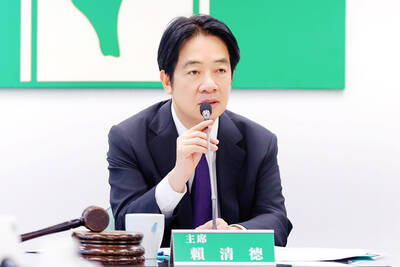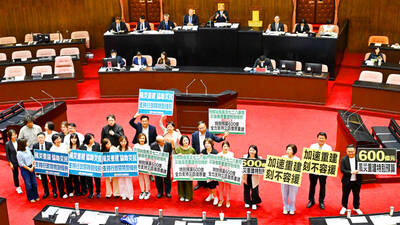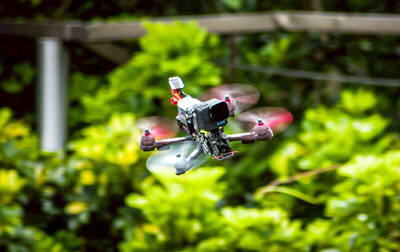Three British NATO troops were killed in an apparent "friendly fire" incident in Afghanistan when a US jet dropped a bomb on them during fighting with the Taliban, officials said yesterday.
The incident, near Kajaki in southern Helmand Province, happened late on Thursday when two US warplanes were called to provide support after an attack by the rebels, the Ministry of Defence in London said.
The deaths are likely to spark anger in Britain, where a coroner ruled earlier this year that a British soldier was unlawfully killed by US pilots in Iraq and criticized the Pentagon for failing to provide information.
"Their patrol was attacked by Taliban insurgents and during the intense engagement that ensued, close air support was called in from two US F15 aircraft to repel the enemy," a ministry statement said. "A single bomb was dropped and it is believed the explosion killed all three soldiers who were declared dead at the scene."
The soldiers were all from 1st Battalion the Royal Anglian Regiment. Two others were injured in the attack and are being treated at Camp Bastion, the main base in insurgency-torn Helmand.
The US embassy in London issued a brief statement saying that the "tragic deaths" would be thoroughly investigated.
"The United States expresses its deep condolences to the families and loved ones of the soldiers who died, and we wish those who were injured a speedy recovery," it said.
Both the British army and the NATO-led International Security Assistance Force (ISAF) launched immediate investigations into the deaths.
"ISAF is committed to finding out exactly how this tragedy occurred and how similar incidents can be avoided," spokeswoman Lieutenant Colonel Claudia Foss said in a statement.
Britain has more than 6,000 troops in Afghanistan, a figure which will increase to over 7,700 this year. They are mostly deployed in the south. A total of 73 British troops have been killed in Afghanistan since 2001.
A British Royal Marine, Jonathan Wigley, 21, was killed by suspected "friendly fire" in Helmand in December last year. British newspapers quoted fellow soldiers as saying he was killed by a US A-10 "tankbuster" jet.
Earlier this year an investigating coroner in Oxford repeatedly expressed his frustration at the Pentagon's failure to provide vital information and witnesses into the death of a British trooper in Iraq.
Lance Corporal Matty Hull died in 2003 when US planes opened fire on his tank in Iraq after mistaking a British convoy for enemy vehicles.
The coroner ruled that Hull's death was a criminal breach of the international law of armed conflict.
Separately in Afghanistan's western Herat Province yesterday, two troops from the US-led coalition, which is separate from ISAF, were killed when their vehicle overturned, a coalition statement said.
The deaths in Helmand and Herat brought to 144 the number of foreign soldiers killed in the country this year, most of them in combat with the Taliban.

President William Lai (賴清德) yesterday criticized the nuclear energy referendum scheduled for Saturday next week, saying that holding the plebiscite before the government can conduct safety evaluations is a denial of the public’s right to make informed decisions. Lai, who is also the chairman of the Democratic Progressive Party (DPP), made the comments at the party’s Central Standing Committee meeting at its headquarters in Taipei. ‘NO’ “I will go to the ballot box on Saturday next week to cast a ‘no’ vote, as we all should do,” he said as he called on the public to reject the proposition to reactivate the decommissioned

US President Donald Trump on Friday said that Chinese President Xi Jinping (習近平) told him China would not invade Taiwan while Trump is in office. Trump made the remarks in an interview with Fox News, ahead of talks with Russian President Vladimir Putin over Moscow’s invasion of Ukraine. “I will tell you, you know, you have a very similar thing with President Xi of China and Taiwan, but I don’t believe there’s any way it’s going to happen as long as I’m here. We’ll see,” Trump said during an interview on Fox News’ Special Report. “He told me: ‘I will never do

The Legislative Yuan yesterday approved an aid and recovery package authorizing the government to allocate up to NT$60 billion (US$1.99 billion) for regions hit by Typhoon Danas and subsequent torrential rains last month. Proposed by the Executive Yuan on Aug. 7, the bill was passed swiftly after ruling and opposition lawmakers reached a consensus in inter-party talks on relief funding and assistance for disaster-stricken areas. The package increases the government’s spending cap from the originally proposed NT$56 billion to NT$60 billion, earmarked for repairing and rebuilding infrastructure, electricity systems, telecommunications and cable TV networks, cultural heritage sites and other public facilities.

FLEXIBLE FORCE: Only about 10 percent of small drones reach their target, an expert said, which is why it is important to make it easier to procure large numbers of drones The military is planning to recategorize military drones as “consumables/munitions,” rather than as aircraft, to speed up the procurement process, the army said yesterday. The Army Command Headquarters said the decision was made because drones, like munitions, need to be rapidly replaced, and thus should be categorized as consumables/munitions “to meet the army’s practical needs.” The headquarters’ confirmation came after the Chinese-language Liberty Times (the Taipei Times’ sister paper) early yesterday reported that the army was about to make the classification change based on the example of the US, which is Taiwan’s biggest arms provider. US Secretary of Defense Pete Hegseth announced a